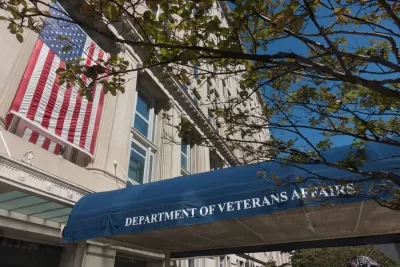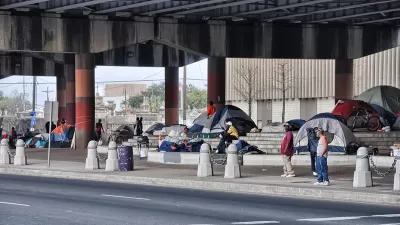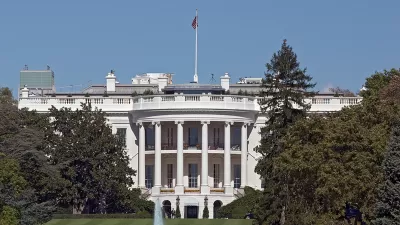The Department of Veterans Affairs prompted outcry when it told advocates and its partners at the Department of Housing and Urban Development that it would cut $460 million for long-term housing for homeless veterans.

The Department of Veterans Affairs (VA) recently floated the idea of cutting a $460 million "from a successful program to reduce homelessness among former military personnel," according to an article by Emily Wax-Thibodeaux, but has since backtracked.
According to Wax-Thibodeaux, the VA "[bowed] to pressure from lawmakers and advocacy groups who criticized the effort as cruel and counterproductive." The program allots $460 million in funding to local VA hospitals for discretionary use—specifically "a voucher program, run by VA and the Department of Housing and Urban Development, that provides long-term living accommodations for the country’s most vulnerable military veterans, many of whom suffer from mental illness."
Arthur Allen and Lorraine Woellert first reported the news of the threat to the program earlier this week:
Anger exploded on a Dec. 1 call that was arranged by Shulkin’s Advisory Committee on Homeless Veterans to explain the move. Advocates for veterans, state officials and even officials from HUD, which co-sponsors the program, attacked the decision, according to five people who were on the call.
The news also breaks the same week as new Department of Housing and Urban Development data on homelessness around the country. While the new data are positive in terms of overall homelessness and for many local communities around the country, the data also report that homeless increased by 1.5 percent among veterans since January 2016, following many years of improvements.
FULL STORY: VA tried to reallocate $460 million earmarked for homeless veterans. Now it says that won’t happen.

Planetizen Federal Action Tracker
A weekly monitor of how Trump’s orders and actions are impacting planners and planning in America.

Maui's Vacation Rental Debate Turns Ugly
Verbal attacks, misinformation campaigns and fistfights plague a high-stakes debate to convert thousands of vacation rentals into long-term housing.

San Francisco Suspends Traffic Calming Amidst Record Deaths
Citing “a challenging fiscal landscape,” the city will cease the program on the heels of 42 traffic deaths, including 24 pedestrians.

Amtrak Rolls Out New Orleans to Alabama “Mardi Gras” Train
The new service will operate morning and evening departures between Mobile and New Orleans.

The Subversive Car-Free Guide to Trump's Great American Road Trip
Car-free ways to access Chicagoland’s best tourist attractions.

San Antonio and Austin are Fusing Into one Massive Megaregion
The region spanning the two central Texas cities is growing fast, posing challenges for local infrastructure and water supplies.
Urban Design for Planners 1: Software Tools
This six-course series explores essential urban design concepts using open source software and equips planners with the tools they need to participate fully in the urban design process.
Planning for Universal Design
Learn the tools for implementing Universal Design in planning regulations.
Heyer Gruel & Associates PA
JM Goldson LLC
Custer County Colorado
City of Camden Redevelopment Agency
City of Astoria
Transportation Research & Education Center (TREC) at Portland State University
Jefferson Parish Government
Camden Redevelopment Agency
City of Claremont





























